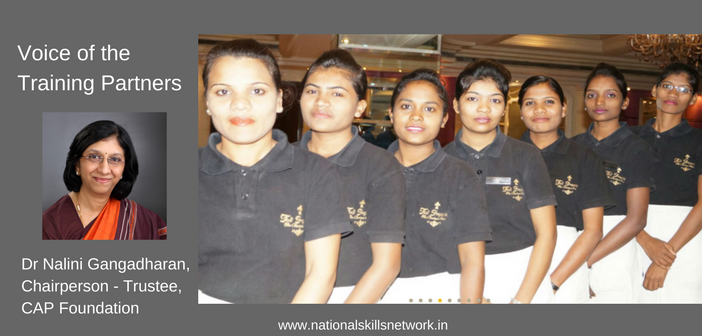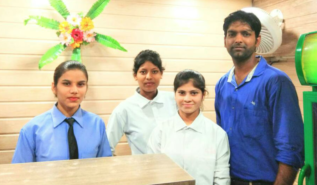Dr Nalini Gangadharan, Chairperson – Trustee, CAP Foundation shares her perspective on the evolving skills ecosystem in India and how it can be made more impactful.
As a founding member of ASTP what would you like to say about the emerging skill-based/vocational training ecosystem in India. What are your observations about the programs that are being conducted, government schemes, role of CSR etc. ?
When we founded ASTP, the principal idea was to bring in some credibility and recognition to the training partner as an important stakeholder in the vocational training ecosystem. This was to be achieved with introduction of accountability, transparency, collaboration with the other stakeholders in the system and development of evidence-based advocacy for innovative and impactful practices at speed, scale and sustainability.
Though there has been many an attempt to introduce disruptive strategies and techniques, I would say ” the churning of the ocean” is still on. We should wait a bit more to find the elixir – that would make the training provider space recognised well enough.
Attempts at building accountability, transparency and scale are initiated and concrete results on sustainable models are yet to emerge.
What are some of the challenges you faced and how did you overcome them while implementing various training programs for employability enhancement , employment and self- employment? Give us an example.
As an organisation that has been in the skill-based vocational training space for long and much before the full-throttled efforts by the government, the focus was on using employability skills training as a transition support route to mainstream out-of-school young people to access the entry level jobs and wages. At the same time, they would pursue their aspirations for better qualifications , skills and higher order job profiles once they start earning and saving and realising the value of higher education. This transition route was to feed into higher vocational education/ training and not just dead end jobs at the end of a short term employability skills training course. This is also in line with projections that stress the need for high skilled categories of the workforce and the diminishing prospects for entry level jobs in the labour market.

While the NSQF development has addressed that the potential youth have to continue to be aspirational for growth, the skilling initiatives stop at a single intervention that leads them to a potential opportunity. Recognising resource limitations , the challenge is to help youth access further financial resources to support to move to upskiling/ further education beyond the first level.
A good example of a youth aspiration-led model for continuous upskilling/ career building was the community college model conceived by IGNOU where youth could move from very short term job-oriented courses right up to very skilled technician levels over time. Unfortunately, while the scheme was well intentioned, it had many operational and other issues that led to its collapse. With the new NSQF framework, a similar system of community colleges that demystify and brand vocational training as a suitable option for NEET youth will be a good way going forward.
Impact of CAP Foundation in the livelihoods space
We are focussed on the youth from most difficult to reach geographies and those in situations of local conflict across India and 11 other countries across Asia and Africa. While our training delivery system is based on youth aspirations, we customise all our delivery to the local context so that the young people own the content and internalise the skills. We are a community-based solution provider that uses market-oriented employability skills training as an impact tool for mainstreaming these youth to become positive, self-reliant and productive citizens with a responsibility to themselves, their families and communities.
 We have reached over 450,000 young people directly with training and an average 76% placements in jobs. We have also steadily moved to encourage and support interested youth to move into micro entrepreneurship and small businesses. Several research studies have highlighted that life skills, financial literacy, savings education, work readiness and entrepreneurship components of the Foundation Course have had more impact on helping these youth to realise their potential and transit to positive pathways much more than mere technical skills training components.
We have reached over 450,000 young people directly with training and an average 76% placements in jobs. We have also steadily moved to encourage and support interested youth to move into micro entrepreneurship and small businesses. Several research studies have highlighted that life skills, financial literacy, savings education, work readiness and entrepreneurship components of the Foundation Course have had more impact on helping these youth to realise their potential and transit to positive pathways much more than mere technical skills training components.
If there are two things that you wish to improve/change in the evolving vocational training space in India what would it be and why?
My first point would be to stop all subsidies and sops given to the young people to participate in the training program. It is taking them away from building a self-reliant attitude so necessary to grow in life to one of entitlements. Instead, take a supportive route to make training available closer and easily accessible by bringing in private and non-profit training providers who meet standards. It is important for the entire family to be involved in the transition that the youth has to make, for becoming a productive worker at the end of the course and making informed choices. This is particularly true for women and youth from remote and backward districts. Currently, alienating the family and cultural context and adding the entitlement mindset leads to poor outcomes in terms of non placements at the end of the course.
 Second, employers need to be onboard, not with sops and free labour supply, but with responsibility as this skilling initiative is based on their requirements and supports the growth of their enterprise. Certified training providers, who enable candidates entering the labour market through certified courses and skills, should be given an incentive by the employer.
Second, employers need to be onboard, not with sops and free labour supply, but with responsibility as this skilling initiative is based on their requirements and supports the growth of their enterprise. Certified training providers, who enable candidates entering the labour market through certified courses and skills, should be given an incentive by the employer.
Training providers currently treated as contractors and employers, who are currently treated as beneficiaries in the ecosystem, must become responsible stakeholders with rights and obligations that will make this a nation-building exercise with accountability and sustainability.
Message to startups in vocational training
While financial returns are the objective of any investor in the startup space, entrepreneurs entering this space should realise that standalone skill-based vocational training has not yet shown viability or financial sustainability in any significant way. Nevertheless, they have emerged as impactful social enterprise, but as a business venture, I am afraid the return on investment is yet to be proven adequately.
Any other points you wish to mention.
I am optimistic that with the serious breed of training providers, the government and emerging partnerships, dialogue and collaboration between the two, we will soon move to a favourable ecosystem that produces more positive results. Having said that, I am also realistic enough to realise youth, their aspirations and the labour market in the new emerging economy is and will continue to be restless, fluid and rapidly changing. The sooner we get used to operating in a every fluid and changing system, the more comfortable we will all be in our work.













